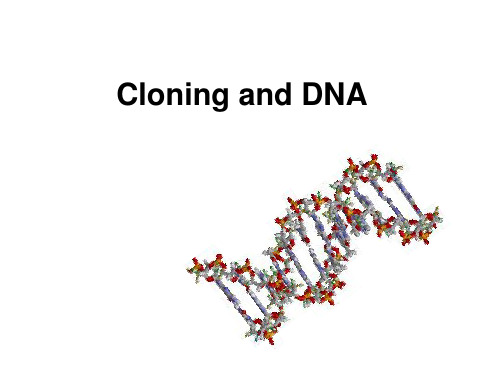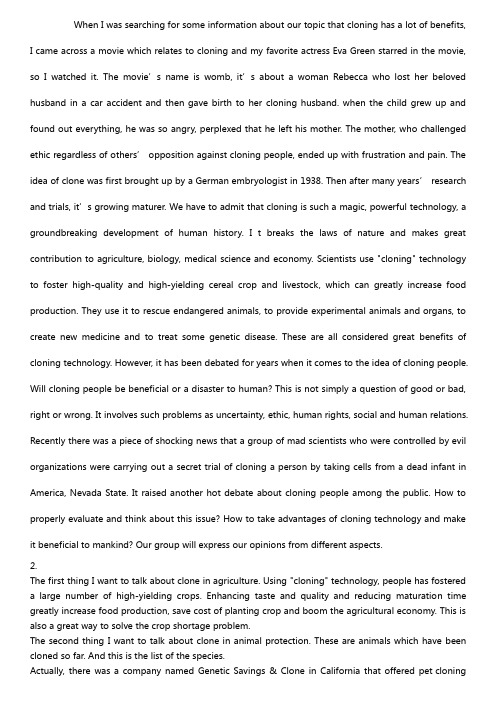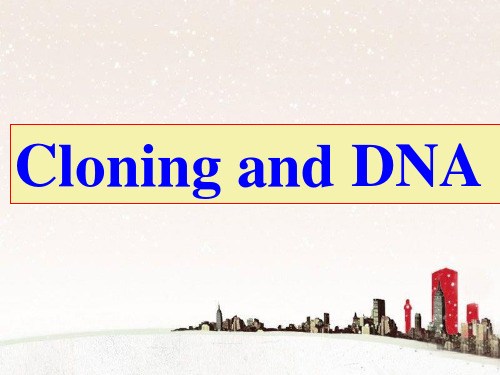cloning_and_DNA new
- 格式:ppt
- 大小:3.40 MB
- 文档页数:31


Cloning is a fascinating topic that has captured the attention of scientists,ethicists, and the general public alike.Heres a detailed English essay on the subject:Title:The Ethical and Scientific Dimensions of CloningIntroduction:Cloning is a process of producing a genetically identical copy of an organism.The term has been in the limelight since the birth of Dolly the sheep in1996.While it holds immense potential for scientific advancements,it also raises several ethical concerns. This essay will explore the scientific aspects of cloning,its potential applications,and the ethical issues surrounding it.Body:1.Scientific Aspects of Cloning:a.Definition:Cloning involves creating a genetically identical copy of an organism, known as a clone,from a single ancestor cell or DNA molecule.b.Types:There are two main types of cloning somatic cell nuclear transfer SCNT and molecular cloning.SCNT is used to create an organism,while molecular cloning is used to produce multiple copies of a gene or DNA sequence.c.Process:In SCNT,the nucleus of a somatic cell is transferred to an enucleated egg cell.The egg is then stimulated to divide and develop into an embryo,which can be implanted into a surrogate mother.2.Potential Applications of Cloning:a.Medical Research:Cloning can be used to create genetically identical cells or tissues for studying diseases and testing new treatments.an Transplants:Cloning could potentially provide a source of organs for transplantation,reducing the risk of rejection.c.Endangered Species:Cloning may help in the conservation of endangered species by increasing their population.3.Ethical Concerns:a.Playing God:Some argue that cloning is an attempt to play God,as it involves creating life in a manner different from natural reproduction.b.Identity and Individuality:Clones may face issues related to their identity and individuality,as they are genetically identical to another being.c.Potential for Abuse:There is a risk of cloning being misused for creating genetically modified super humans or for other unethical purposes.d.Animal Welfare:The process of cloning often involves the use of animals,raisingconcerns about animal welfare and the potential suffering involved.Conclusion:Cloning is a complex and controversial topic that intertwines scientific advancements with ethical dilemmas.While it holds the potential to revolutionize medicine and conservation efforts,it also poses significant ethical challenges.It is crucial to strike a balance between harnessing the benefits of cloning and addressing the ethical concerns it raises.This can be achieved through robust regulatory frameworks,public discourse,and a commitment to responsible scientific practices.In conclusion,cloning is a doubleedged sword that offers both immense potential and ethical challenges.As we continue to explore its possibilities,it is essential to navigate this complex terrain with caution,empathy,and a strong ethical compass.。


分子克隆英文版Molecular CloningMolecular cloning is a fundamental technique in modern molecular biology and biotechnology, allowing for the isolation, amplification, and manipulation of specific DNA sequences. This process involves the transfer of a DNA fragment from one organism to a self-replicating genetic element, such as a plasmid or a virus, which can then be introduced into a host cell. The host cell, typically a bacterium or a eukaryotic cell, then replicates the inserted DNA, producing multiple copies of the desired genetic material.The primary motivation behind molecular cloning is the need to obtain large quantities of a specific DNA sequence for various applications, including genetic research, disease diagnosis, and the production of recombinant proteins. By cloning a gene of interest, researchers can generate an unlimited supply of the target DNA, enabling further analysis, modification, and utilization.The process of molecular cloning can be divided into several key steps. The first step involves the isolation of the desired DNA fragment, which can be obtained from a variety of sources, such asgenomic DNA, complementary DNA (cDNA), or synthetic DNA. This DNA fragment is then inserted into a suitable vector, such as a plasmid or a viral genome, using specialized enzymes called restriction endonucleases and DNA ligase.The resulting recombinant DNA molecule is then introduced into a host cell, typically a bacterial cell like Escherichia coli, through a process called transformation. The transformed host cells are then cultured, and the cells containing the desired recombinant DNA are selected and amplified. This amplification process allows for the production of large quantities of the target DNA sequence.One of the most important applications of molecular cloning is the production of recombinant proteins. By cloning a gene encoding a specific protein, researchers can express and purify the protein in a host cell, such as a bacterium or a eukaryotic cell line. This technique has been instrumental in the development of numerous therapeutic proteins, including insulin, growth hormones, and monoclonal antibodies, which have revolutionized the field of medicine.Molecular cloning is also essential for the study of gene function and regulation. By cloning a gene and introducing it into a host cell, researchers can investigate the expression, localization, and interactions of the encoded protein, as well as the regulatory mechanisms that control its activity. This knowledge is crucial forunderstanding the complex biological processes that underlie human health and disease.In addition to its applications in research, molecular cloning has also found widespread use in the field of genetic engineering. By modifying the genetic material of organisms, scientists can create genetically modified organisms (GMOs) with desirable traits, such as increased crop yield, improved nutritional value, or resistance to pests and diseases. This technology has significant implications for agriculture, environmental conservation, and the development of new therapeutic strategies.Despite its many benefits, molecular cloning is not without its challenges and ethical considerations. The potential for misuse or unintended consequences of genetic manipulation has sparked ongoing debates and the need for robust regulatory frameworks to ensure the responsible and ethical use of this powerful technology.In conclusion, molecular cloning is a fundamental technique in modern molecular biology and biotechnology, enabling the isolation, amplification, and manipulation of specific DNA sequences. This technology has revolutionized numerous fields, from genetic research and medicine to agriculture and environmental conservation. As the field of molecular biology continues to evolve, the applications and implications of molecular cloning willundoubtedly continue to expand, posing both exciting opportunities and important ethical considerations for the future.。

When I was searching for some information about our topic that cloning has a lot of benefits, I came across a movie which relates to cloning and my favorite actress Eva Green starred in the movie, so I watched it. The movie’s name is womb, it’s about a woman Rebecca who lost her beloved husband in a car accident and then gave birth to her cloning husband. when the child grew up and found out everything, he was so angry, perplexed that he left his mother. The mother, who challenged ethic regardless of others’ opposition against cloning people, ended up with frustration and pain. The idea of clone was first brought up by a German embryologist in 1938. Then after many years’ research and trials, it’s growing maturer. We have to admit that cloning is such a magic, powerful technology, a groundbreaking development of human history. I t breaks the laws of nature and makes great contribution to agriculture, biology, medical science and economy. Scientists use "cloning" technology to foster high-quality and high-yielding cereal crop and livestock, which can greatly increase food production. They use it to rescue endangered animals, to provide experimental animals and organs, to create new medicine and to treat some genetic disease. These are all considered great benefits of cloning technology. However, it has been debated for years when it comes to the idea of cloning people. Will cloning people be beneficial or a disaster to human? This is not simply a question of good or bad, right or wrong. It involves such problems as uncertainty, ethic, human rights, social and human relations. Recently there was a piece of shocking news that a group of mad scientists who were controlled by evil organizations were carrying out a secret trial of cloning a person by taking cells from a dead infant in America, Nevada State. It raised another hot debate about cloning people among the public. How to properly evaluate and think about this issue? How to take advantages of cloning technology and make it beneficial to mankind? Our group will express our opinions from different aspects.2.The first thing I want to talk about clone in agriculture. Using "cloning" technology, people has fostered a large number of high-yielding crops. Enhancing taste and quality and reducing maturation time greatly increase food production, save cost of planting crop and boom the agricultural economy. This is also a great way to solve the crop shortage problem.The second thing I want to talk about clone in animal protection. These are animals which have been cloned so far. And this is the list of the species.Actually, there was a company named Genetic Savings & Clone in California that offered pet cloningservices between 2004 and 2006. For those who lost their pets at that time. The cloning pets really comforted them to some extend. But because of not owing mature technology, the company closed down.However, one of the most practical usage of cloning nowadays, it is to protect our lovely friends in this world and save the rare and endangered animals. For example, in 2004, the endangered ferret was successfully cloned.I must to say that we cannot use cloning technology to reproduce dinosaurs like the movie Jurassic Park shows. But we can improve the cloning technology to foster some rare animals like pandas.As far as I am concerned, if we can improve our technology and use it in the right way and to right things, it is truly good for human beings. We should be confident that we can handle the difficulties and choose the correct direction to develop cloning.From my point of view, Clone, to a certain degree, is beneficial to mankind.Firstly, Such disease as Parkinsons will possiblly be cured in the future in the hope of further applying of clone. Recently, Nature. Medicine reported that scientists establish the feasibility of treating individual mice via therapeutic cloning. It means that Parkinsons will be cured through clone.Secondly, it helps to deal with organ failure. According to the global organ donation and transplantation institute, the western developed countries contribution rate generally higher, among them, Spain is 35.1/ million people, the French is 25.9/ million people. However, according to China Ministry of health , China organ donation rate is only 0.03/ million people. But, in china, each year about 1,500,000 people for the end organ function failure need to transplant, only 10,000 can get transplantation. If clone can use in organ failure, it would save many people’s lives. Besides, on the modern science and technology, the types of organ transplantat rejection remains the most vexing thing. If the "human cloning" of organs available to the "original people", then there will not be any concerns. Therefore, the "clone" of medicine is helpful.Recently, a father wrote that his 5 year old son died of leukemia. The father felt very sad and he said that he hope that the country could make rapid progress in clone so he could clone his son after his son died.CloneThere has such news. The human cloning experiment will produce a clone of a 10 month old girlwho died last year. The first human cloned baby expected to be born in 2001.More than 50 surrogate mothers have been selected to carry the human cloned foetuses throughout pregnancy, including the girl’s 22 year old elder sister. Clonaid says five British couples, including two pairs of homosexual men, have asked to be cloned.When you are at that situation, what would you do?As you see, it may raise some ethic problems.First, how do the cloned address the clone? You call them sister brother? But the clones are so young to be your children. So you call them son, daughter? But in term of biology, they are the same generation as you.Second, humanity problem.How people treat human cloning, people or object? As the Golden Rule says-- In my will, I have left to the next generation such parts of my poor body that it can salvage. I suppose if you take it literally, you would accept life as a Donor in film-- "Never Let Me Go," because after all, that is the purpose for which the clones were born.In the film, there is a society within the larger one consisting of children cloning who were created in a laboratory to be Donors. They exist to grow hearts, kidneys, livers and other useful items, and then, sadly, to die after too much has been cut away. I don’t think this treatment to human cloning is humanity.And the cloning technique is unsafe and inefficient and the risks greatly outweigh any marginal benefit High failure rateCloning animals through somatic cell nuclear transfer is simply inefficient. The success rate ranges from 0.1 percent to 3 percent, which means that for every 1000 tries, only 1 to 30 clones are made. Forexample, Dolly was the only lamb born out of 277 attempts at cloning.Abnormalities in clonesA cloned animal might not even be a true clone. This means that despite being cloned, the DNA could still go through changes from the original donated DNA. When cells divide in order to make a new creature, they normally go through changes in the DNA sequence. It is so far impossible to produce a cloned animal that is 100% genetically identical to another. And complete DNA reprogramming is needed for normal or near-normal development. Incomplete programming will cause the embryo to develop abnormally or fail.What may happen if we create out an Abnormal cloning child.Paul and Jessie Duncan have lost their beloved eight-year-old son Adam in a tragic accident. They can’t accept the tragedy so they decide to clone Adam with the help of Dr.Richard Wells.Adam's new life follows a comfortable and predictable patternBut after his 8-year-old birthday, things go horribly wrong. The "new" Adam begins to suffer from night terrors and frightening flashbacks as a sinister personality begins to emerge. Jessie and Paul are terrified of their own son and his cold, vacant stare.So as we have seen, cloning as a science still has a long way to go in perfecting itself.There has been a long and heated discussion about the cloning for a long time. But no matter what the position you are in, we can not deny that the cloning is one of the greatest invention of human and it’s development must create a new time for human.At present, the cloning has showed its prospect in many fields, such as rescuing endangered species, application in medical and agricultural fields and creating transgenic animals and so on.Most of the protesters worry about the ethic problem caused by the cloning people. They think that it betrays the moral system. Just imagine that there is a copy one of your grandmother, and she is younger than you with your grandmother’s appearance. But we know that there is no leaf the same as another. The cloning people are also complete people. They have their own mind and character. In otherwords, they are not the complete copy of the human with the same gene.In our group’s opinion, what we human should worry is not the ethic problem but the ways we treat the cloning people. There is a thought that let the cloning people provide their organs for human. Such a thought is immoral and must be forbidden in the process of the development of the cloning.In conclusion, the cloning is a great and excellent invention in the history of science, so it should not be forbidden by human. In history, every new invention must cause people’s scare and claim. For example, when the first tube baby was given birth in London, there were also many people to oppose it. But now, there are about three hundred thousand tube babies in the world. The cloning must have its disadvantage, but nothing will be perfect.As the development of the cloning, there must be a mature laws and moral system to restrict it--------it is a regular social pattern. Thus, towards the cloning, we should support it but not abuse it.。

你对使用克隆的看法英语作文Cloning is a controversial topic that has sparked intense debates and discussions in various fields, including science, ethics, and technology. The concept of cloning refers to the creation of genetically identical copies of organisms, cells, or DNA fragments. While some people view cloning as a groundbreaking scientific achievement with numerous potential benefits, others express concerns about its ethical implications and long-term consequences. In this article, we will explore the different perspectives on cloning and discuss its potential applications and ethical considerations.Advancements in cloning technology have opened up new possibilities in various fields, such as medicine, agriculture, and conservation. One of the most significant applications of cloning is in the field of medicine. Cloning can be used to produce tissues and organs for transplantation, potentially solving the problem of organ shortages and reducing the risk of rejection. Additionally, cloning can aid in the development of new treatments and drugs by creating animal models that closely mimic human diseases, allowing researchers to study and test potential therapies more effectively.In the agricultural sector, cloning offers the potential to enhance crop yields and improve food production. By cloning plants with desirable traits, such as drought resistance or disease resistance, farmers can ensure a more abundant and resilient food supply. Cloning can also be used to preserve endangered species by creating genetically identical copies and reintroducing them into their natural habitats. This approach can help prevent the extinction of valuable species and restore ecological balance.Despite the potential benefits, cloning also raises significant ethical concerns. One of the primary ethical considerations is the potential for human cloning. The idea of creating genetically identical human beings raises complex moral and philosophical questions. Critics argue that human cloning undermines the uniqueness and dignity of each individual, leading to a loss of individuality and a devaluation of human life. Moreover, there are concerns about the potential abuse of cloning technology, such as the creation of "designer babies" or the exploitation of cloned individuals for their organs or labor.Another ethical concern is the impact of cloning on biodiversity. Cloning endangered species may provide a short-term solution to their conservation, but it does not address the underlying causes of their decline, such as habitat destruction or climate change. Cloning can also reduce genetic diversity, making species more susceptible to diseases and environmental changes. Preserving biodiversity requires a holistic approach that focuses on habitat conservation, sustainable practices, and addressing the root causes of species decline.In conclusion, cloning is a complex and multifaceted topic that elicits diverse opinions and perspectives. While cloning offers potential benefits in medicine, agriculture, and conservation, it also raises significant ethical concerns. The ethical implications of human cloning and the impact on biodiversity require careful consideration and regulation. As the technology continues to advance, it is crucial to have open and informed discussions to ensure that cloning is used responsibly and ethically. Only through thoughtful dialogue and comprehensive research can we navigate the ethical dilemmas and fully understand the implications of cloning on our society and the natural world.。
高三英语阅读课文克隆cloning的文本分析主旨大意生殖性克隆是创造一个遗传上完全相同的生物体副本,其DNA 完全相同。
科学家于1996年在苏格兰爱丁堡附近的罗斯林研究所创造了第一只克隆哺乳动物多利羊。
多莉是通过一种叫做体细胞核移植的技术创造的。
科学家们从一只成年羊的乳腺中取出一个细胞,并将其含有DNA的细胞核移植到一个卵细胞中,而卵细胞的细胞核已被移除。
该细胞发育成一个正常的胚胎,并被植入一只代孕母羊体内,代孕母羊怀着胎儿,生下了多莉,一个与捐赠细胞核的成年母羊完全相同的基因复制。
自多莉以来,研究人员已经克隆了许多大型和小型哺乳动物,包括马、山羊、牛、小鼠、猪、猫和兔子。
他们希望"治疗性克隆"(一种干细胞疗法)有朝一日能提供基因匹配的组织和器官,用于移植手术,而不会产生病人排斥的风险。
Reproductive cloning is the creation of a genetically identical copy of an organism, with exactly the same DNA. Scientists created the first cloned mammal, Dolly the sheep, at the Roslin Institute near Edinburgh in Scotland in 1996.Dolly was created by a technique called somatic cell nuclear transfer. Scientists took a cell from an adult sheep's mammary gland and transplanted its DNA-containing nucleus into an egg cell from which thenucleus had been removed. The cell developed into a normal embryo, which was implanted into a surrogate mother sheep who carried the fetus to term and gave birth to Dolly, an exact genetic replica of the adult female that donated the cell nucleus.Since Dolly, researchers have cloned many large and small mammals including horses, goats, cows, mice, pigs, cats and rabbits. They hope that 'therapeutic cloning' (a type of stem cell therapy) may one day provide genetically matched tissues and organs that can be used in transplant operations without any risk of the patient rejecting them.。
血常规报告怎么看(1)红细胞(RBC)正常情况:男性: (4-5) *1012/L; 女性: (3。
5-4。
5) *1012/L检查增高表示:真性红细胞增多症,严重脱水,肺原性心脏病,先天性心脏病,高山地区的居民,严重烧伤,休克等。
降低表示:贫血,出血(2)血红蛋白(Hb)正常情况:男性: (120-150) g/L; 女性: (105-135) g/L增高表示:真性红细胞增多症,严重脱水,肺原性心脏病,先天性心脏病,高山地区的居民,严重烧伤,休克等。
降低表示:贫血,出血(3)白细胞(WBC)正常情况:(4-10)*109升高表示:各种细胞感染,炎症,严重烧伤。
明显升高时应除外白血病。
降低表示:白细胞减少症,脾功能亢进,造血功能障碍,放射线,药物,化学毒素等引起骨髓抑制,疟疾,伤寒,病毒感染,副伤寒(4)中性粒细胞正常情况:(50-70)%增高表示:细菌感染,炎症;降低表示:病毒性感染(5)嗜酸性粒细胞正常情况:(0-00。
75)%增高表示:慢性粒细胞白血病及慢性溶血性贫血。
(6)淋巴细胞正常情况:(20-30)%增高表示:百日咳,传染性单核细胞增多症,病毒感染,急性传染性淋巴细胞增多症,淋巴细胞性白血病;降低表示:免疫缺陷(7)单核细胞正常情况:(3-8)%增高表示:结核,伤寒,疟疾,单核细胞性白血病。
(8)血小板(PLT)正常情况:(100-300)%升高表示:原发性血小板增多症,真性红细胞增多症,慢性白血病,骨髓纤维化,症状性血小板增多症,感染,炎症,恶性肿05l26,缺铁性贫血,外伤,手术,出血,脾切除后的脾静脉血栓形成,运动后。
降低表示:原发性血小板减少性紫癜,播散性,药物过敏性血小板减少症,弥漫性血管内凝血,血小板破坏增多,血小板生成减少,再生障碍性贫血,骨髓造血机能障碍,药物引起的骨髓抑制,脾功能亢进。
(9)血沉正常情况:男性: (0-15) mm/h; 女性: (0-20) mm/h增快表示:急性炎症,结缔组织病,严重贫血,恶性肿05l26,结核病。